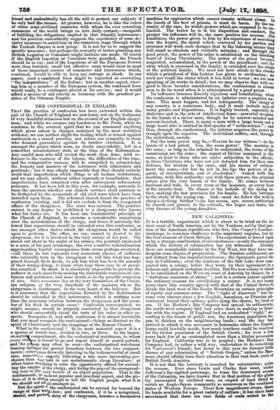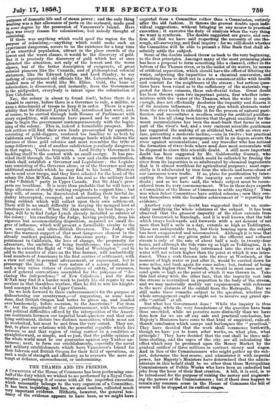NEW CALEDONIA.
IT is a terrible experiment which is about to be tried on the far west coast of North America, not by the Yankees, not by that por- tion of the American republicans who live, like Cooper's Leather- stockings, in ceaseless obedience to the migratory impulse, but by the Government of Great Britain. The experiment is forced upon us by a strange combination of circumstances—nearly the strangest which the history of colonization has yet witnessed. Already there are remarkable colonies in the Far West, but they have un- dergone some degree of preparation. The Russian settlements are not distant from the imperial territories ; the Spaniards paved the way in California ; even the denizens of the Salt Lake were com- pacted into a colony, before they went, by their agreement in a hideous and absurd sectarian doctrine. But the new colony is about to be established on the Western coast of America by chance, by a " fortuitous concourse of atoms" ; and to a certain extent against the ordinary reasons for establishing a colony. It is not many years since this country agreed with that of the United States to divide the land west of the Rocky Mountains on certain of equity and common-sense. The " right of discovery principles has come very obscure since a few English, American, or Prussian ad- venturers traced their solitary paths along the shores, by land or sea. If the Hudson's Bay Company had spread its settlements, the north-west company had had some share in making us fami- liar with the region. If England had an undoubted " right," ac- cording to the tenets of public law, the American population be- gan to thicken on the neighbouring lands ; and the day had arrived in which it was necessary to determine where the Repub- licans could lawfully reside, how much territory could be reserved for the titular possession of the British Crown ; for even a few years back few of us contemplated more than a titular possession for England. California was to be peopled ; the Hudson's Bay Company had, in rather a wild way, undertaken to do something for Vancouver's Island ; but down to this year we foresaw little chance of any colonization of " British Oregon," unless the Mor- mons should affably turn their attention to that vast back-yard of British North America. It is not that the territory is unsuited for colonization ; quite the reverse. Ever since Lewis and Clarke first went, wider Jefferson's far-sighted patronage, to trace the downward course of the Columbia, we have known that in that portion of the globe lay unoccupied by civilized man, an empire of land fitted to enrich an Anglo-Saxon community as numerous as the combined states of Western Europe. There flow magnificent rivers, there lie lands available for a great variety of culture ; it has since been ascertained that there are vast Sells of coals suited to the
purposes of domestic life and of steam power ; and the only
wonting was a fair allowance of ports on the seaboard, made in some degree by the possession of Vancouver's Island. Here then was every reason for colonization, but nobody thought of colonizing. If there was anything which could spoil the region for the purpose of colonizmg,—anything which could make such an experiment dangerous, secure to us the existence for a long time of an unsettled population, attract to the place crowds of the lowest and the worst classes, it would be the discovery of gold. But it is precisely the discovery of gold which has at once attracted the attention, not only of the lowest and the worst classes, but of the better description of emigrants, of great colonial pioneers like the Canards, and of philosophical colonial statesmen, like Sir Edward Lytton and Lord Stanley, to say nothing of experienced old officials like Mr. Labouchere, or long- headed men of the world like Mr. Ellice!. Gold, the bane of colonization, is discovered, and instantly, from the Government to the pickpocket, everybody is intent upon the colonization of New Caledonia.
Nay, the colony is about to found itself, before there is a Cunard to convey, before there is a Governor to rule, a militia, or even a detachment of troops to keep it in order. There is a pos- sibility that Sir Edward Lytton's bill, introduced last week, and, of course, to be carried through both Houses of Parliament with every expedition, will scarcely have passed and be sent out in time to begin the government contemporaneously with the begin- ning of the colony. This is, indeed a formidable prospect. Bri- tish settlers will find their own lands preoccupied by squatters, consisting of gold-diggers, rendered too familiar to us both by California and Victoria ; of that strange horde which follows the fortunes of those gold colonies and most resembles the tribe of camp-followers; • and of another subdivision peculiarly dangerous in that region, Yankee trespassers. Lord Derby's Goverment is buckling itself to the contest with no small energy. It has pro- vided itself through the bill with a new and elastic constitution, which shall establish a Governor and Legislature ; the Legisla- ture consisting of the Governor alone, or of the Governor and any additional materials which he may find to his hand. Ministers are to send over troops, and they have selected for the head of the colony Sir Alan M'Nab, famous for his zeal as the military head of the "British" party in Upper Canada. But Sir Alan's pros- pects are troublons. It is more than probable that he will have a large allowance of steady working emigrants to support him ; but they will, of course, be discontented at finding their laWful in- dustry interrupted, cramped, and embarrassed, by the mass of living rubbish which will collect upon their own settlement. There will be no small difficulty in keeping the mongrel host of interlopers in order. When Sir Alan arrives, his best hope, per- haps, will be to find Judge Lynch already installed as curator of the colony ; his excellency the Judge, having probably, from his vigorous but accommodating disposition, acquired no small de- gree of influence, which will present a iormidable rivalry to the new, energetic, and ultra-British Governor. The Judge will have the warmest support of that most dangerous element in the already resident population, the American party. For disap- pointment in California, the love of change, the propensity for adventure, the ambition of being troublesome, the missionary desire to extend the flight of "the bird of Washington" and to add to the number of stars on the blue banner, will undoubtedly lead numbers of Americans to the first centres of settlement, with a view not only to personal advancement, or amusement, but to preoccupy the land. The very nature of a colony founded in such a way raises visions of committees of safety, of caucuses, and of general conventions assembled for the purposes of "de- claring the independence" of New Caledonia ; and Sir Alan M'Nab may find it a harder work to justify his old repute by new services in that thankless warfare, than he did to win his knight- hood amongst the rebels of Upper Canada.
Do we look forward to those embarrassments for the purpose of disheartening our countrymen,—of suggesting, as some have done, that British Oregon had better be given up, and handed over handsomely, before coercion, to the Americans ? Far from it : but the magnitude of the embarrassment, with the military and political difficulties offered by the interposition of the Ameri- can continents between our imperial head-quarters and that out- lying settlement, dictate two distinct necessities, which must not be overlooked, but must be met from the very outset. They are, first, to place our relations with the powerful republic which lies between us and that region of rising contest in a condition so straightforward, so simple, and so just, that the public opinion of the whole world must be our guarantee against any Yankee un- fairness ; next, to form our establishments, especially the naval and military establishments which have Vancouver's Island for their fulcrum and British Oregon for their field of operations, on such a scale of strength and efficiency as to overawe the mere at- tempt at defiance, encroachment, or undermining.
• II I



























 Previous page
Previous page